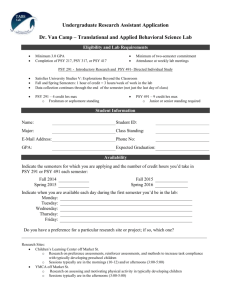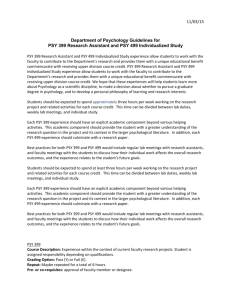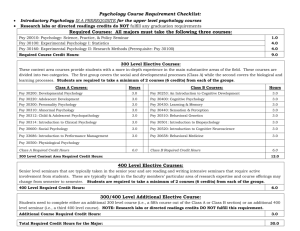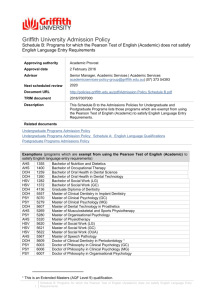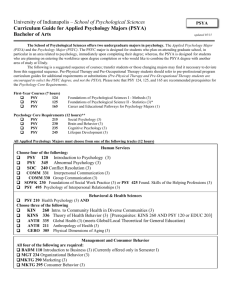ED01(Rev) NeuroscienceEmphasisNewForm11_19_13_Final
advertisement
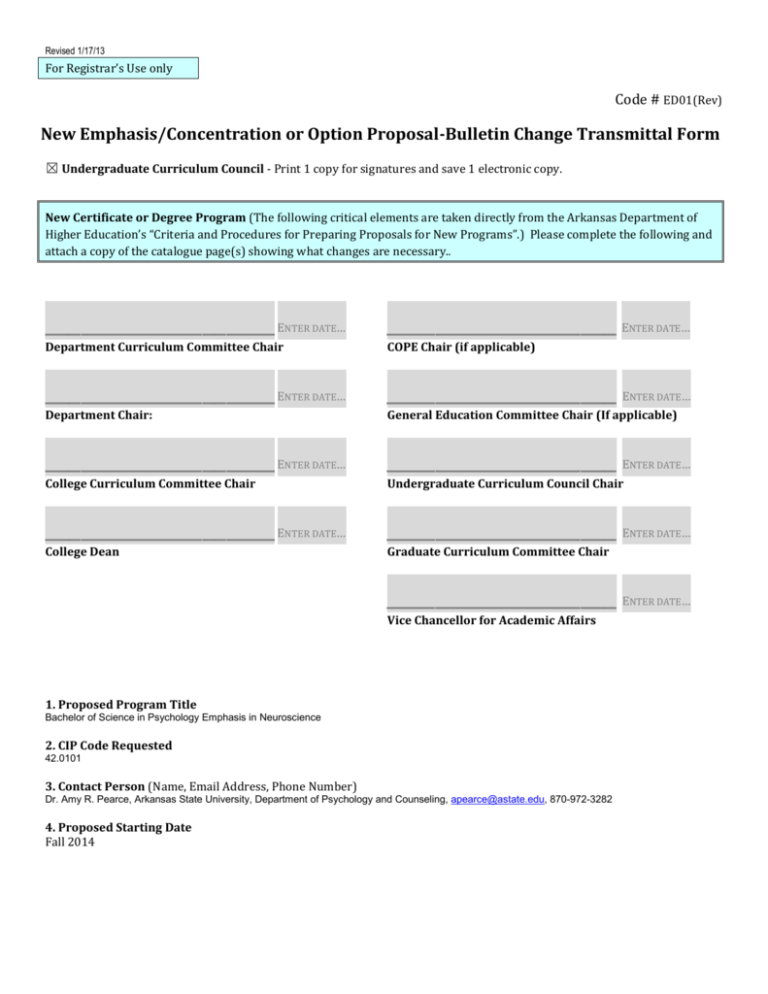
Revised 1/17/13 For Registrar’s Use only Code # ED01(Rev) New Emphasis/Concentration or Option Proposal-Bulletin Change Transmittal Form ☒ Undergraduate Curriculum Council - Print 1 copy for signatures and save 1 electronic copy. New Certificate or Degree Program (The following critical elements are taken directly from the Arkansas Department of Higher Education’s “Criteria and Procedures for Preparing Proposals for New Programs”.) Please complete the following and attach a copy of the catalogue page(s) showing what changes are necessary.. ___________________ ENTER DATE… ___________________ ENTER DATE… ___________________ ENTER DATE… ___________________ ENTER DATE… Department Curriculum Committee Chair Department Chair: ___________________ ENTER DATE… ___________________ ENTER DATE… ___________________ ENTER DATE… ___________________ ENTER DATE… ___________________ ENTER DATE… COPE Chair (if applicable) General Education Committee Chair (If applicable) College Curriculum Committee Chair Undergraduate Curriculum Council Chair College Dean Graduate Curriculum Committee Chair Vice Chancellor for Academic Affairs 1. Proposed Program Title Bachelor of Science in Psychology Emphasis in Neuroscience 2. CIP Code Requested 42.0101 3. Contact Person (Name, Email Address, Phone Number) Dr. Amy R. Pearce, Arkansas State University, Department of Psychology and Counseling, apearce@astate.edu, 870-972-3282 4. Proposed Starting Date Fall 2014 Revised 1/17/13 From the most current electronic version of the bulletin, copy all bulletin pages that this proposal affects and paste it to the end of this proposal. To copy from the bulletin: 1. 2. 3. 4. 5. 6. 7. 8. 9. 10. Minimize this form. Go to http://registrar.astate.edu/bulletin.htm and choose either undergraduate or graduate. This will take you to a list of the bulletins by year, please open the most current bulletin. Find the page(s) you wish to copy, click on the “select” button and highlight the pages you want to copy. Right-click on the highlighted area. Click on “copy”. Minimize the bulletin and maximize this page. Right-click immediately below this area and choose “paste”. For additions to the bulletin, please change font color and make the font size larger than the surrounding text. Make it noticeable. For deletions, strike through the text, change the font color, and enlarge the font size. Make it noticeable. From p 165 of the UGB Major in Psychology Bachelor of Science Emphasis in Neuroscience A complete 8-semester degree plan is available at http://registrar.astate.edu University Requirements: See University General Requirements for Baccalaureate degree (p.40) First Year Making Connections Course: PSY 1013, Making Connections: Psychological Wellness General Education Requirements: See General Education Curriculum for Baccalaureate Degree (p.82) Students with this major and emphasis area must take the following: Math 1023 College Algebra Six hours of Humanities (Required Department Gen. Ed. Option) Sem. Hrs. 3 Sem. Hrs. 35 Revised 1/17/13 BIOL 1003 Biological Science AND BIOL 1001 Biology Laboratory Major Requirements: PSY 2013, Introduction to Psychology Sem. Hrs. 0-3 Required ONLY if not taken as part of the General Education Requirements. PSY 2023, Psychology as a Science and a Profession 3 PSY 3103, AND PSY 3101, Quantitative Methods for Behavioral Sciences and Laboratory 4 PSY 3113, Research Design in Psychology 3 PSY 3123 AND PSY 3121, Experimental Methods in Psychology and Laboratory 4 Psychology as a Natural Science (select two of the following): 6 Required: PSY 3214 Introduction to Neuroscience 13 PSY 4323 Physiological Psychology Select two of the following: PSY 3303, Motivation PSY 4323, Physiological Psychology PSY 4343, Learning Processes PSY 4363, Cognitive Psychology PSY 4383 Introduction to Behavior Analysis Psychology as a Social Science (select three of the following): Only two of the three following courses may be used to satisfy the requirements for this category: PSY 3403, PSY 3413, and PSY 3453 9 Revised 1/17/13 Select three of the following: PSY 3403, PSY 3413 and PSY 3453 PSY 3403, Child Psychology PSY 3413, Adolescent Psychology PSY 3453, Developmental Psychology PSY 3523, Introduction to Social Psychology PSY 3823, History of Psychology PSY 4533, Abnormal Psychology PSY 4543, Personality Development Integrative Psychology (select twelve six hours from the following): 12 6 PSY courses from Psychology as a Natural Science or Psychology as a Social Science may be substituted for courses in the category. PSY 3603, Positive Psychology PSY 3613, Cultural Psychology PSY 3703, Educational Psychology PSY 380V, Special Problems PSY 4053, Today’s Families PSY 4173, Introduction to Psychological Tests and Measurements PSY 4723, Organizational Psychology PSY 4853, Psychological Seminar Sub-total 41-44 Revised 1/17/13 42-45 Minor or Area of Concentration (as approved by advisor): Sem. Hrs. Sub-total 18-24 Electives: Sem. Hrs. Electives 14-23 13-22 Total Required Hours: 120 From p 428 of the UGB PSY 2023. Psychology as a Science and a Profession An overview of psychology as a science and as a profession encompassing psychological research methods, an exploration of the major and skills required for successful completion, areas of specialization, careers in psychology, and postgraduate opportunities. Fall, Spring. PSY 3101. Quantitative Methods Laboratory Laboratory for Quantitative Methods Laboratory associated with PSY 3103. Two hours per week. Corequisite, PSY 3103. Fall, Spring, Summer. PSY 3103. Quantitative Methods for Behavioral Sciences Introduction to basic statistical techniques and methodology applicable to research problems in the behavioral sciences. Prerequisite, MATH 1023 or a more advanced mathematics course. Corequisite, PSY 3101. Fall, Spring, Summer. PSY 3113. Research Design in Psychology An introduction to psychological research with emphasis on the critical functions and limitations of both experimental and non-experimental designs, ethics, measurement, and statistical analyses of relevance. Prerequisites, PSY 2023 and PSY 3103. Fall, Spring. PSY 3121. Experimental Methods in Psychology Laboratory Laboratory for Experimental Psychology Laboratory associated with PSY 3123. Two hours per week. Corequisite, PSY 3123. Fall, Spring. PSY 3123. Experimental Methods in Psychology An indepth consideration of the ethical application of experimental design and methods toward a causal analysis of behavior. Emphasis is on ethical issues directly relevant to control procedures and researcher conduct and bias and developing skills necessary to recognize and utilize the components of experimental design and to interpret and evaluate results. Prerequisite, PSY 3113; Corequisite, PSY 3121. Fall, Spring. PSY 3214. Introduction to Neuroscience. An introduction to the normal structure and function of the nervous system in relation to behaviors and experiences in humans and nonhumans with an integrated laboratory component. Topics include brain structure, physiology, development, drugs of abuse, bodily senses, and behavior. Prerequisites, MATH 1023 College Algebra; PSY 2013; BIOL 1003 and BIOL 1001; or permission of instructor. Special course fees may apply. Fall. PSY 3303. Motivation Survey of animal and human research in motivation. Topics include instincts, biological drives, acquired drives, incentive, secondary reinforcement, frustration, and theories of motivation. Fall, Summer. Revised 1/17/13 PSY 3403. Child Psychology Principles and patterns of mental, social, emotional, and physical development. No more than 6 credit hours from the following courses may be used to satisfy the requirements for a major or minor in psychology, PSY 3403, PSY 3413, and PSY 3453. Fall, Summer. PSY 3413. Adolescent Psychology The influence of factors including cognition, motivation, perception, learning, emotion, and personality on development during adolescence. No more than 6 credit hours from the following courses may be used to satisfy the requirements for a major or minor in psychology, PSY 3403, PSY 3413, and PSY 3453. Spring, Summer. PSY 3453. Developmental Psychology Study of the life cycle from prebirth through death including an examination of the major methods, theories, and empirical findings. No more than 6 credit hours from the following courses may be used to satisfy the requirements for a major or minor in psychology, PSY 3403, PSY 3413, and PSY 3453. Fall. PSY 3523. Introduction to Social Psychology Analysis of the situational factors which influence various behaviors including aggression, altruism, and interpersonal attraction. Fall, Summer. PSY 3603. Positive Psychology Scientific study of happiness, psychological well-being, and character strengths. Spring. PSY 3613. Cultural Psychology This course focuses on issues of how human culture impacts the individuals behavior, attitudes, and mental health. Fall. PSY 3703. Educational Psychology Survey of principles as they apply to education. Fall, Spring, Summer. PSY 380V. Special Problems in Psychology Individual problems in psychology arranged in consultation with the instructor and the department chairman. May be repeated for credit but no more than 6 credit hours may be applied toward psychology major requirements. Demand. LETTER OF NOTIFICATION – 3 NEW OPTION, CONCENTRATION, EMPHASIS (Maximum 18 semester credit hours of new theory courses and 6 credit hours of new practicum courses) 1. Institution submitting request: Arkansas State University, Department of Psychology and Counseling 2. Contact person/title: Amy R. Pearce, Associate Professor of Psychology 3. Phone number/e-mail address: 870-972-3282/ apearce@astate.edu 4. Proposed effective date: Fall 2014 5. Title of degree program: Bachelor of Science in Psychology 6. CIP Code: 42.0101 7. Degree Code: 3070 Revised 1/17/13 8. Proposed option/concentration/emphasis name: Neuroscience 9. Reason for proposed action: The proposal for a neuroscience emphasis area is in response to assessment of student perceptions of the Bachelor of Science in Psychology program which currently has no emphasis areas. Data indicate that students are interested in tailoring their undergraduate psychology degree in order to have a more focused undergraduate experience and to be competitive for graduate level programs. Many students indicated an interest in pursuing graduate level education (79% of students sampled). This emphasis area would provide background for students interested in obtaining advanced degrees in neuroscience, psychology, biology, or medical and health professions. It would also provide background for students interested in careers that involve rehabilitation, counseling, treatment of brain damage, neurological disorders, and working with the aging. It is appropriate to include such an emphasis area within our curriculum. According to the American Psychological Association, "psychology is the study of the mind and behavior. The discipline embraces all aspects of the human experience — from the functions of the brain to the actions of nations, from child development to care for the aged. . .” Further, neuroscience is a highly interdisciplinary field that includes many sciences, including, but not limited to, biology, chemistry, and psychology. It is not uncommon for undergraduate psychology programs to offer one or more courses in neuroscience. In fact, many undergraduate neuroscience degree programs, minors, or areas of concentration are typically 'nested' within psychology departments (Wiertelak & Ramirez, 2008). The resulting change in the Psychology as a Natural Science category on the B.S. in Psychology degree plan is considerable as students will now be required to take Introduction to Neuroscience and Physiological Psychology as well as two other courses such as Motivation, Learning, Cognitive Psychology or Behavior Analysis which will differentiate the emphasis area from the general program. Additionally, the appearance of the emphasis area on a degree transcript may be beneficial to some students applying for graduate programs. 10. New option/concentration/emphasis objective The goal of the proposed emphasis area is to prepare undergraduate students for access to competitive graduate programs that lead to a master’s or doctoral degree in neuroscience or related fields. The objectives of the emphasis area in neuroscience are to offer students an undergraduate experience which would focus on (1) rapid advances in technologies designed for both manipulation and measurement of components of the nervous system that have resulted in a compelling field of basic science encompassing the natural collaboration between behavioral, cognitive, biological, physiological, and molecular approaches; (2) normal brain functioning, as well as disease, disability, psychological pathology, trauma, and degenerative loss associated with neurological disorders and aging; (3) researchsupported evidence and expert opinions to interpret and apply the evidence from animal models toward enhancement, prevention, maintenance, treatment, or possible cures in humans with neurological conditions. 11. Provide the following: a. Curriculum outline - List of required courses The neuroscience emphasis would place no restrictions or additional requirements on the minor or area of concentration that is already required but would increase the current 41 credit hours for the Bachelor of Science in Psychology to 42 hours. List of required courses [see bulletin pages copied within this form]. Students would not need to exceed the current 120 hours for baccalaureate degrees. b. New course descriptions PSY 3214. Introduction to Neuroscience An introduction to the normal structure and function of the nervous system in relation to behaviors and experiences in humans and nonhumans with an integrated laboratory component. Topics Revised 1/17/13 include brain structure, physiology, development, drugs of abuse, bodily senses, and behavior. This course will provide the background knowledge needed for more advanced courses, such as physiological psychology, or graduate level courses in neuroscience. c. Program goals and objectives The goal of the proposed emphasis area is to prepare undergraduate students for access to competitive graduate programs that lead to a master’s or doctoral degree in neuroscience by offering them the necessary background in the structures and functions of the nervous system that underlie behavior (PSY 3214); and provide students with additional prerequisite coursework and skill development opportunities (already offered by the program). This proposed emphasis areas embedded within the bachelor of science in psychology degree program will contribute to the same student learning outcomes as those of the overall program (see below). However, more specifically, students in this emphasis area will be able to 1) demonstrate an understanding of psychology in relation to natural sciences (e.g., biology, ethology, neuroscience), 2) demonstrate knowledge and understanding of learning, behavior, cognition, and biological and physiological bases of behavior, 3) under appropriate supervision, collect, analyze, and report data designed to answer a behavioral or psychological question, 4) Apply APA ethical guidelines in the design, data collection, analysis, interpretation, and reporting of behavioral or psychological research, 5) demonstrate understanding of APA guidelines for the ethical treatment of human and nonhuman research participants/subjects. d. Expected student learning outcomes The proposed emphasis area embedded within the bachelor of science in psychology degree program should lead to the same student learning outcomes as those of the overall program. Students successfully completing the emphasis in neuroscience should be able to: o o o o o o o o o o o o Demonstrate an understanding of psychology in relation to natural sciences (e.g., biology, ethology, neuroscience). Demonstrate knowledge and understanding of learning, behavior, cognition, and biological and physiological bases of behavior. Locate relevant research, theory, and information necessary to plan, conduct, and interpret results of research studies. Formulate a testable research hypothesis. Design basic studies to address behavioral or psychological questions using different research methodologies. Under appropriate supervision, collect, analyze, and report data designed to answer a behavioral or psychological question. Apply APA ethical guidelines in the design, data collection, analysis, interpretation, and reporting of behavioral or psychological research. Demonstrate understanding of APA guidelines for the ethical treatment of human and nonhuman research participants/subjects. Demonstrate understanding of the appropriate use of various data analytic techniques for addressing different types of questions and hypotheses. Demonstrate knowledge of different research methodologies employed by psychologists, including an understanding of the appropriate use of various research designs for addressing different types of questions and hypotheses. Evaluate the appropriateness of conclusions presented in disseminated research relevant to psychology. Demonstrate critical thinking skills and abilities acquired through training and experience in scientific methodology including the ability to identify different scientific methods for gathering information. Revised 1/17/13 o o o o o o Describe and compare/contrast major scientific methods for gathering and analyzing information and for explaining behavior. Demonstrate basic personal computer skills such as making and transferring files, generating and printing basic text documents that adhere to format guidelines, using and accessing e-mail, blackboard, and the internet search engines. Demonstrate information competence at each stage in the following process: o Organize and report information by using appropriate software to produce understandable reports of the behavioral/psychological literature, methodology, and statistical analyses in APA or other appropriate style, including graphical representations of data. Use information and technology ethically and responsibly. Demonstrate effective writing skills in multiple formats and for multiple purposes. Demonstrate effective oral communication skills in multiple formats and for multiple purposes. 12. Will the new option be offered via distance delivery? No. 13. Mode of delivery to be used: Mode of delivery will vary. Lectures, laboratories, collaborative and independent research will all be important components of the emphasis area. 14. Explain in detail the distance delivery procedures to be used: N/A 15. Is the degree approved for distance delivery? No. 16. List courses in option/concentration/emphasis. Include course descriptions for new courses. Required Courses for B.S. Psychology with an Emphasis in Neuroscience Core: Each of the following (14 hours) PSY 2023 Psychology as a Science & Profession PSY 3103 Quantitative Methods PSY 3101 Quantitative Methods Laboratory PSY 3113 Research Design in Psychology PSY 3123 Experimental Methods in Psychology PSY 3121 Experimental Methods Laboratory Psychology as a Natural Science (13 hours) Required: PSY 3214 Introduction to Neuroscience [New Course] PSY 4323 Physiological Psychology Select 2 of the following: PSY 3303 Motivation PSY 4323 Learning Processes PSY 4363 Cognitive Psychology PSY 4383 Behavior Analysis Psychology as a Social Science (9 hours) Revised 1/17/13 Select three of the following: PSY 3403 PSY 3413 PSY 3453 PSY 3523 PSY 3823 PSY 4533 PSY 4543 Child Psychology Adolescent Psychology Developmental Psychology Introduction to Social Psychology History of Psychology Abnormal Psychology Personality Development Two additional courses (6 hours) are required. Select them from the Integrative Grouping (below) or from Psychology as a Natural Science or Social Science groupings (above). PSY 3603 Positive Psychology PSY 3613 Cultural Psychology PSY 3703 Educational Psychology PSY 380V Special Problems PSY 4053 Today’s Families PSY 4173 Introduction to Psychological Tests and Measurements PSY 4723 Organizational Psychology PSY 4853 Psychological Seminar Additional Emphasis in Neuroscience Restrictions. BIOL 1003 Biological Science AND BIOL 1001 Biology Laboratory should be taken for the general education Life Science requirements. One required new course, PSY 3214 Introduction to Neuroscience is proposed for the emphasis area. PSY 3214. Introduction to Neuroscience An introduction to the normal structure and function of the nervous system in relation to behaviors and experiences in humans and nonhumans with an integrated laboratory component. Topics include brain structure, physiology, development, drugs of abuse, bodily senses, and behavior. Prerequisites, MATH 1023 College Algebra; PSY 2013; BIOL 1003 and BIOL 1001; or permission of instructor. Special course fees may apply. Fall. 17. Specify the amount of the additional costs required, the source of funds, and how funds will be used. Current faculty members are available to teach the new Introduction to Neuroscience, a 4 credit-hour course. A designated teaching assistant is required who will be assigned to facilitate the lecture and lab, which is standard practice for undergraduate psychology courses with co-requisite labs. Further, an additional cost is required to offer the Introduction to Neuroscience course within the emphasis in neuroscience. A modest materials and supplies budget will be necessary for the purchase of expendable laboratory supplies such as sheep brains, cockroaches, earthworms, cow eyes, gloves, electrodes, etc to be used in the integrated laboratory component. For this reason, a lab fee of $7 per credit hour (4 hours x $7 = $28) is being proposed in the New Course Proposal-Bulletin Change Transmittal Form for PSY 3214. President/Chancellor Approval Date: Enter date... Board of Trustees Notification Date: Enter date... ___________________ Vice Chancellor for Academic Affairs ENTER DATE… Revised 1/17/13

